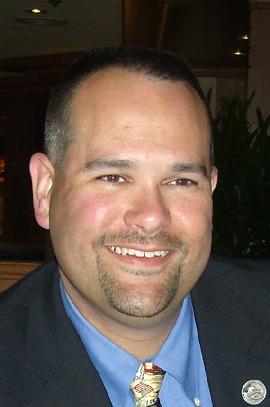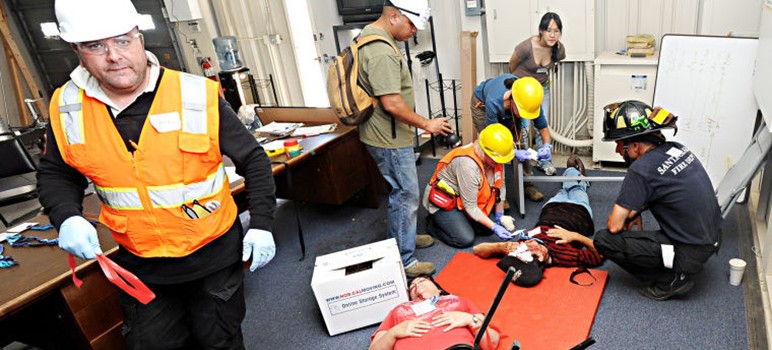San Jose—home to an international airport, massive public works projects and the highest concentration of Fortune 500 companies in the United States—is woefully underprepared for emergencies.
A 2015 assessment found the city far below preparedness benchmarks in every category set by the U.S. Department of Homeland Security, including transportation, cyber-security, healthcare and public warning systems. On Tuesday, the City Council will discuss a plan to address some of those critical shortfalls.
Like in other major American cities, San Jose’s million-plus residents and 60,000 businesses face natural and manmade threats ranging from earthquakes, floods, fires, technological disruption, mass shootings and terrorism. Judging by the U.S. Census Bureau’s real-time map of disasters taking place throughout the nation, emergency seems to be the status quo.
Nationally, the Federal Emergency Management Agency (FEMA) administers disaster relief efforts. California’s state-level counterpart is the Governor’s Office of Emergency Services, which offers support that’s replicated on the local level through law enforcement, regional and municipal agencies. In San Jose, the responsibility lies with the city’s Office of Emergency Services.

San Jose's Office of Emergency Services Director Ryan Broughton.
San Jose has doubled down on disaster preparedness in the past couple of years. In 2014, the city hired Ryan Broughton—who oversaw disaster management programs for the U.S. Navy—to lead its Office of Emergency Services. At the time, the office hadn’t assessed local preparedness in four years, had never achieved accreditation and still grappled with budget shortfalls.
Under Broughton’s watch, the city assessed its preparedness shortfalls and laid out a blueprint for accrediting its emergency readiness program by 2021.
This past year, the city fast-tracked some of that plan to prepare for a rain-soaked El Niño winter as well as several presidential candidate visits and the Super Bowl 50 in nearby Santa Clara. The city also established an alternate emergency command center in the San Jose Police Department’s south substation.
At the start of this fiscal year, the city doubled its emergency services budget to $53,000 and pegged $130,000 in one-time funding to revive the Community Emergency Response Team (CERT), a volunteer training program, and $169,000 for mass community warning systems.
Vice Mayor Rose Herrera and council members Raul Peralez, Tam Nguyen and Chappie Jones said the city should make it a priority to enlist CERT volunteers who speak Spanish and Vietnamese. It should also make an effort to keep the line of communication open with previously trained CERT volunteers to make sure they remain ready for the worst.
“Natural disasters occur suddenly and indiscriminately,” they wrote in a joint memo. “Ensuring that our community has adequate CERT training will increase the chances of survival in the event of an unpredictable but likely to occur natural disaster such as the next large earthquake.”
More from the San Jose City Council agenda for Sept. 13, 2016:
- Pretty soon, owners of vacant land in the city proper can get a tax break if they allow urban farmers to grow food and raise a few chickens on the property. Santa Clara County already created a policy allowing for urban ag “incentive zones.” San Jose will follow suit. But county planners offered some constructive criticism about the ordinance language: Keep it simple. “In June 2015, the county Board of Supervisors adopted a resolution of consent to allow the establishment of urban agricultural incentive zones programs within each eligible city,” Kirk Girard, the county’s planning director, wrote in a letter to the city. “The wording is simple, and unconditional. … The department believes that an equally simple, unconditional consent by the city is most appropriate, as it would be more conducive to successful implementation.”
WHAT: City Council meets
WHEN: 1:30pm Tuesday
WHERE: City Hall, 200 E. Santa Clara St., San Jose
INFO: City Clerk, 408.535.1260


I applaud the effort, but the budget looks a little puny considering the size if the city and the magnitude of potential
disasters avalible to this area.
“At the start of this fiscal year, the city doubled its emergency services budget to $53,000” $53k won’t pay for much, and the previous $26.5k wouldn’t even support a part time intern. But we have millions for people who run homeless programs that have failed consistently.
Just goes to show , what a joke this City has become
Ever notice how our politicians like to describe San Joser in much exaggerated ways… “the capital of Silicon Valley” or in this article the “highest concentration of Fortune 500 companies in the United States.” Get real, Santa Clara, Mountain View and Palo Alto all have more Fortune 500 companies than our PODUNK San Joser.
That is what happens when you pass measure B and half of your emergency responders leave to other agencies. And then you got an ex idiot from the city council filing law suits against the new measure F. Good luck San Jose you seem to always get what you vote for.
Forgot to add, and the city council is voting on a few chickens. Time to leave this failing city.
The City says it allocates “50% of it’s 3 billion dollar per year budget to public safety!” Yeah really?
We have a crises with the huge Sanctuary City homeless immigration increase, and a police staff at half what it was 3-5 years ago. We have organized gang burglary and unbridled drug abuse. We have virtually no Community Emergency Response Teams, training, or drills – for 1.2 Million people. The schools are minimally prepared and trained for any emergency event, active shooters, pandemic, or terrorist threats.
Plain old bait and switch budget politicians that have lost track of serving the people and the responsibility of spending of our tax revenues wisely. Citizen apathy and ignorance of our government’s activities is killing this City.
… owners of vacant land in the city proper can get a tax break if they allow urban farmers to grow food and raise a few chickens on the property.
So the taxpayers must now subsidize some chicken farmers? That’s insane.
There’s no credible reason to reward people for having a hobby, at the expense of everyone else. Let them pay for their own hobby, and leave the rest of us out of it.
I’ve raised chickens, and it’s fun. But it’s hardly necessary. Where is the rationale? How does the Council justify pandering to a very small handful of folks who want their hobby subsidized?
Is it because we already pay so much in taxes that the Council has to find ways to spend the money?
It’s time for a new Council. And a new Mayor, too—but that goes without saying.
I thought raising farm animals within the city limits was verboten in San Jose. Perhaps we can go hunting for possums and pigeons too!